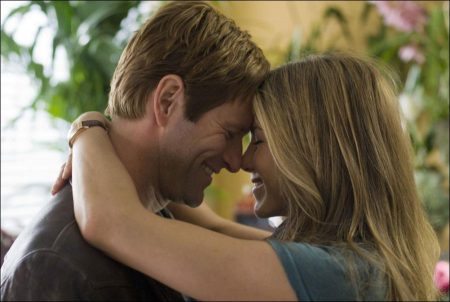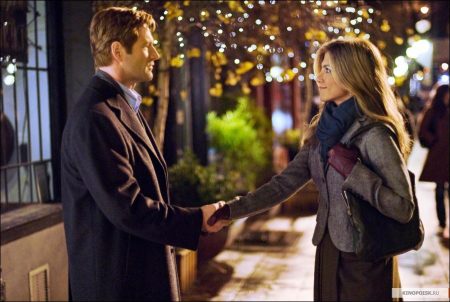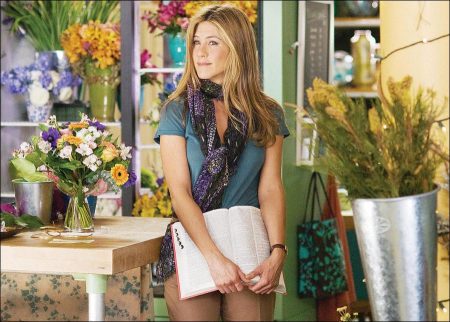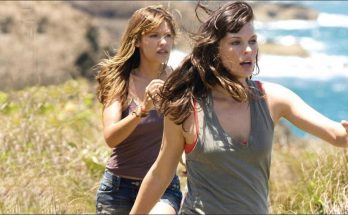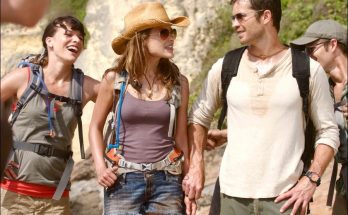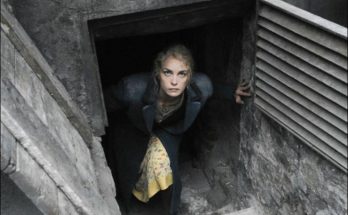Tagline: Sometimes when you least expect it…
Burke is a motivational speaker whose book about dealing with grief is a best seller. His wife died in a car accident three years ago. He’s in Seattle to lead a week-long workshop on healing and to negotiate a major multi-media deal. But something’s amiss: he’s a closet drinker, he won’t ride elevators, his moods swing, he’s estranged from his wife’s father, and he’s very much alone. In a hotel hallway, he bumps into a woman arranging flowers, tries to chat with her, and gets the brush-off. She’s Eloise, a local florist who’s just broken up with a boyfriend. He’s persistent and they eventually go to dinner – it goes badly. What’s blocking Burke? Can the physician heal himself.
Love Happens is a 2009 American romantic drama film written by Mike Thompson and Brandon Camp, and directed by Brandon Camp. Starring Aaron Eckhart and Jennifer Aniston. It was released on September 18, 2009. On its opening weekend, the film opened at #4 behind I Can Do Bad All By Myself, The Informant!, and Cloudy with a Chance of Meatballs respectively with $8,057,010.
About the Production
For filmmaker Brandon Camp, the journey to the romantic drama Love Happens started several years ago when he lost his mother. “It was a very difficult process for me,” he offers. “There was denial at first; I didn’t really feel anything at all for about a year. All of a sudden, it hit me one day and there was just a flood for six months. I found out that there was something very interesting in the process of grieving and what people go through.”
Camp’s longtime writing partner, Seattle-based producer Mike Thompson, was moved by how his friend was coping with the loss and wanted to work with him on a new project in which they could explore the themes of grief, letting go and acceptance. As Thompson spends a good deal of time traveling to Los Angeles, he grew interested in the physical and metaphorical idea of what it means for someone to move on. He approached Camp about bringing the two concepts together for a new screenplay. Burke walks over hot coals at his seminar.
“We both related to the idea that when you travel, your entire world is turned upside down,” says Thompson. “When you’re on a trip, you might meet the girl of your dreams, you might crash and die, you might run into somebody that begins the career of your life. You’re discombobulated. Travel breaks down all of the barriers and puts you in a state of vulnerability and openness to experience new things. We seized that idea and used it as a starting point.”
The co-writers, who have worked together for more than 15 years, note that they are drawn to meaning-of-life questions when they begin a script. For this project, Thompson explains, “We asked, `What do you do and how do you react in the aftermath of loss?’We tried to make light of some of these existential questions and the more absurd aspects of grieving and death-not get mired in the maudlin aspects of it, but rather flip the coin and see where the light is. Our objective was to make a movie about transformation and light, hope and joy, and redemption and rebirth.”
For the film, nothing about the journey from pen to screen was traditional. “Normally, we’re methodical,” explains Camp. “When we write together, every word is agreed upon.” They decided to shake things up with their latest collaboration. As they began, Camp wrote five pages and sent them to Thompson without discussing the content. Thompson added on to that copy, writing five more pages and sending that back to his partner; they continued in this manner for the first 50 pages. “It was freedom,” remembers Camp. “We forgot about the hell of the developmental process and just had fun again, getting back to the reason why we got into screenwriting in the first place.”
As the story began to unfold, they “came up with the idea of a grief guru and the contradiction that he is living,” Thompson continues. “Then we got structured and came back to our normal writing mode.” During this period, they made the decision that Camp would direct and Thompson would produce their film.
For their protagonist, the screenwriters imagined Dr. Burke Ryan, a psychotherapist and self-help expert who has stifled the grief he’s felt since the sudden death of his wife three years earlier; Burke has channeled all of his energy into helping other people let go of pain while ignoring his own. When romance unexpectedly enters his life in the form of free-spirited florist Eloise Chandler, Burke is pushed to confront the many truths he’s long been denying.
Camp elaborates: “We like writing characters who are ordinary people that find themselves in extraordinary situations. That’s how Burke came about. He was just a normal guy writing articles for Psychology Today, and this horrible tragedy befell him. The next thing you know, he has become an accidental overnight sensation and a supposed expert in grief and dealing with one’s emotions. But he’s also an accidental hypocrite. It’s only after he meets Eloise that he’s finally pushed to stare in the mirror and see that he hasn’t dealt with his own demons.”
In May 2006, Camp and Thompson approached producer Scott Stuber with their script. Stuber was moved by the story about two people who connect just when they’ve both reached a breaking point. “I loved that it was about human beings who are stuck in their own internal problems,” offers Stuber. “But when they stop and reach out to each other, they help each other grow and fall in love. I found that an interesting idea to explore.”
The producer appreciated that the writers had crafted a story in which the main characters get a chance at redemption. He continues: “What I liked about Burke is that he’s someone who has all these demands on his business life, but he wasn’t facing his personal issues. A lot of people power through whatever their responsibilities are and don’t reach out or deal with the emotional part of their lives. Burke is someone who puts up a public façade, but deep down wants to meet someone. When he meets Eloise, she is someone who sees he’s got more to offer. She helps him get through and, ultimately, fall in love.”
The first actor to sign on to Love Happens was Aaron Eckhart, who came aboard in January 2007. He was followed by Jennifer Aniston in March of the same year. Aniston was keen to work with Eckhart and also reunite with Stuber, with whom she had worked on their 2006 global hit The Break-Up, co-starring Vince Vaughn. Once the lead actors were in place, Universal Pictures gave the project the green light and it was time to cast the rest of the team.
While many writers struggle to make the move to first-time directors, Camp felt the transition was much helped by securing his perfect cast. “I hoped and dreamed that we would have this kind of a cast,” the filmmaker says. “But what was amazing to me is that every first choice I had we actually ended up with. Jen Aniston, Aaron Eckhart, Martin Sheen, Dan Fogler and the rest of our cast were my first choices for the film. That never happens.”
When casting the role of Dr. Burke Ryan, director Camp and producers Stuber and Thompson found an actor who was both believable as a widower and one who could elicit empathy from the audience… even when he’s being duplicitous. Camp explains: “Although Burke is lying a bit, it’s very accidental and because of his own circumstances. There’s a great empathy for Aaron and he has such an amazing smile, you can forgive him on screen for his indiscretions. He is also nuanced, and when he delivers a line, it is complex.”
Continue Reading and View the Theatrical Trailer
Love Happens (2009)
Directed by: Brandon Camp
Starring by: Jennifer Aniston, Aaron Eckhart, Dan Fogler, Judy Greer, Martin Sheen, Joe Anderson, John Carroll Lynch, Sasha Alexander, Clyde Kusatsu, Anne Marie DeLuise, Michelle Harrison
Screenplay by: Brandon Camp, Mike Thompson
Production Design by: Sharon Seymour
Cinematography by: Eric Alan Edwards
Film Editing by: Dana E. Glauberman
Costume Design by: Trish Keating
Set Decoration by: Lesley Beale
Art Direction by: Kendelle Elliott
MPAA Rating: PG-13 for language including sexual references.
Distributed by: Universal Pictures
Release Date: September. 18, 2009
Visits: 50
